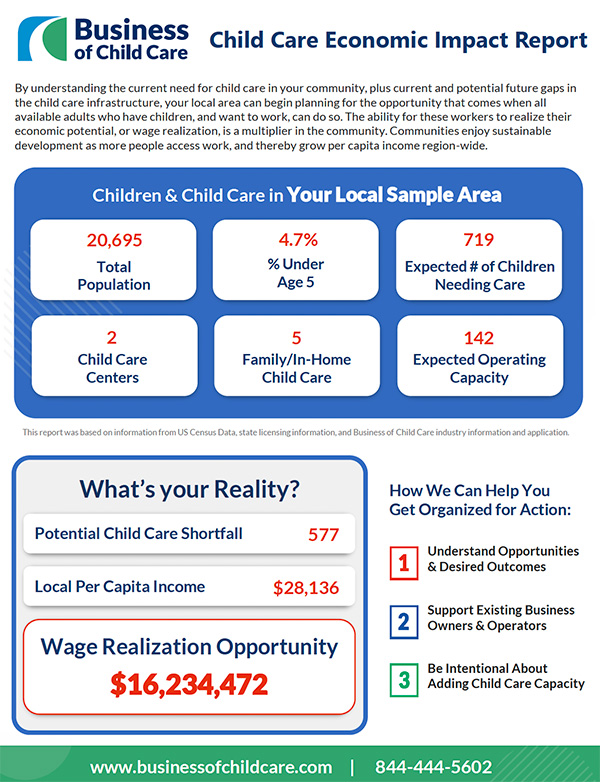Child Care Economic Impact Consultation
The Economic Impact Report Consultation is a 45-minute session designed to provide communities with a high-level overview of their child care landscape, focusing on wage realization impacts and economic opportunities. This session offers stakeholders initial insights and strategies to assess child care challenges and explore potential growth opportunities.
Our Child Care Economic Impact Consultation Includes:
Local Child Care Analysis
Understanding the current child care landscape and identifying economic benefits and opportunities to enhance child care capacity now and for the future.
Personalized Insights
Understand your community's unique child care needs and potential risks, ensuring a targeted approach to local economic development.
Strategic Guidance
Learn how our 'Whole Community Approach' can empower your community to strategically tackle child care challenges, translating insights into action.

What is Wage Realization?
Child care is more than a basic need for families. It’s an economic multiplier and an accelerator for economic growth. Accessible child care empowers workers to realize their true wage potential, providing employers with the workforce they need for growth. This leads to stronger economies and stronger communities.
“Jeff and his team at Business of Child Care provided the piece of the puzzle we were missing when we began to address the child care crisis in our area. Child Care has not only increased in our area, but it has also improved through the work of Business of Child Care.”
– Laurrie Minor, Director, Sullivan Chamber of Commerce, Moultrie County, Ill.
Three Pillars Supporting Wage Realization
Communities looking to strengthen their economy by realizing the true wage potential of their workforce must ensure workers are supported by readily available, quality child care. Business of Child Care bases its approach on three pillars that support community wage realization:
1. Strengthen and Sustain Existing Child Care Providers
To maintain a stable and high-quality child care infrastructure.
- Recognition – Awards, public acknowledgements and professional development. Providers who feel valued are more likely to remain in the profession, ensuring continuity.
- Financial Support & Resources – Community grants, access to training and development, necessary materials and facilities to offer high-quality care to help providers succeed in business and provide better services for families and children.
- Create a Culture of Support – Create networks and communities of practice where providers can share experiences, resources and support, reducing burnout and turnover.
2. Create Favorable Conditions to Address Unmet Needs
To ensure all families have access to quality child care, which supports workforce participation.
- Start-up Grants & Low-Cost Financing – Grants, tax breaks, subsidies that incentivize providers to establish new child care programs, expanding access for families.
- Incentives Aligned to Unmet Community Needs – Align funding for start-up costs to incentivize the creation of child care businesses that address child care gaps: care that falls outside of traditional work hours, child care for special needs children, etc.
- Community Partnerships – Build a network of partnerships with local businesses, education and government stakeholders to offer financial support, shared resources and collaboration making it easier for existing and new providers to thrive.
3. Develop Spaces that Support Optimal Outcomes
- Purpose-Driven Spaces – Designed with specific needs in mind: flexible hours, supporting children with special needs, enhancing early childhood education.
- Community Engagement – Involve the community to identify gaps in existing child care to ensure new spaces are used effectively and add value to the community.
- Sustainable Models – Creating financial plans that incorporate diverse funding sources, including public and private investment and community contributions to ensure new child care spaces remain operational and beneficial in the long-term.
Why Business of Child Care?
Since 2021, our team has consulted with more than 200 communities and counties. In addition, our work with child care providers has resulted in the following outcomes:
Creation of more than
Retention of more than
Support of more than
“The ability of families to find adequate child care impacts their ability to work and the overall economic success of the region. Jeff and his team have had a positive impact in both strengthening our existing child care businesses, as well as encouraging the development of new child care spaces.”
– Rae Jean Hansen, Vice President of Early Childhood, SMIF Early Childhood Education
